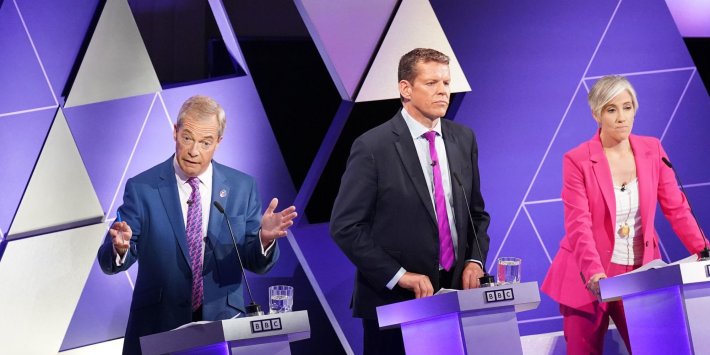
Reform leader Nigel Farage (left) and Lib Dem deputy leader Daisy Cooper (right) appeared in the BBC Election Debate last year alongside Plaid Cymru leader Rhun ap Iorwerth (middle) and other party leaders (Alamy)
8 min read
The Liberal Democrats are closely watching Reform UK, with some party figures suggesting they are ready to borrow tactics from Nigel Farage to sharpen their political message.
The Lib Dems and Reform both had reasons to be delighted by the result of last year’s general election.
Ed Davey’s party won a record 72 parliamentary seats, unseating several high-profile Tories in the process, to become the third biggest party in the House of Commons.
Reform won a much smaller number, five, but on 14 per cent of the vote — confirming its arrival as a significant force in British politics.
Since then, however, it is the latter that has enjoyed the greater momentum, surging to as high as 30 per cent in some opinion polls, ahead of all other parties. The Lib Dems, on the other hand, have struggled to demonstrate the same level of progress, hovering at around the level of national support that it picked up in July.
While the Lib Dems are staunch critics of nearly everything Reform stands for, there’s a growing recognition that Farage’s strategy – offering vision before detail, picking fights that resonate, and leaning on personality – contains lessons for their party.
“Reform is flipping the table, breaking the consensus and saying ‘we can’t carry on like this, we must do something radically different’,” said Bobby Dean, Lib Dem MP for Carshalton and Wallington.
He spoke to PoliticsHome after a get-together of Lib Dem MPs and activists at the Social Liberal Forum (SLF) conference last weekend.
“I don’t like what they’re offering, but that’s what they’re offering, right? I’d like the Lib Dems to be positioned in a similar way.”
Reform are not going out there talking about their policies
The SLF event, hosted in deputy leader Daisy Cooper’s constituency of St Albans, just outside of London, brought more left-leaning party members together with MPs and councillors to discuss what the Lib Dems stand for in the post-2024 landscape. The event included panels on understanding Reform, making the case for a “radical re-evaluation” of the economy, and the seemingly perennial question: “Who are the Liberal Democrats and what do they want?”
Despite the result last July and further success at the May local elections, there was a palpable mood of frustration among attendees, many of whom wanted greater momentum and a national vision that goes beyond potholes and planning applications.
“I am somewhat surprised that you are still working on a plan for the economy,” said one attendee during a panel with Cooper, Dean and science spokesperson Victoria Collins.
“When I am on the doorsteps, people will ask me: ‘Are you going to put up our taxes? Are you going to reduce our benefits?’ How should I answer them?”
To her annoyance, the MPs did not have an answer. Cooper said the first half of the parliament should be spent defining a long-term vision, with policies to follow later. Dean echoed this: “We need to get a collective agreement as a party about where we’re heading towards.”
“Reform are not going out there talking about their policies,” Collins insisted. “We’ve got to meet people where they’re at.”
A Lib Dem councillor later told PoliticsHome: “What are we actually known for? People know what Reform stands for… I don’t think we would consider ourselves to be wishy-washy or centrist, but that is where lots of people have us.”

At the conference, leading political scientist Sir John Curtice argued that the average Reform voter was essentially the opposite of the average Lib Dem voter. He suggested there is therefore “very little” the Lib Dems can do about Reform’s rise.
Deputy leader Cooper appeared to disagree, arguing that polling showed “crossover” in why people voted for Reform or the Lib Dems in the May local elections: “One was our policies on the NHS and social care, and the other one was people thought we were the most competent people to run the local council.”
“[Reform] is not just a successor party to the Brexit Party or to UKIP,” she warned. “They are broadening their appeal… and we just have to be mindful of that.”
Davey’s own language has become punchier in recent weeks, in what one party source described as an effort to start “ruffling feathers”.
Last week, the Lib Dem leader accused the BBC of “not doing a very good job” of holding Farage and Reform to account. Earlier this month, he told The Guardian that “you can see Starmer almost sleep-walking to becoming continuity Rishi Sunak” – marking a stronger tone in his criticism of the Labour Prime Minister.
We need to pick more fights that others aren’t going to jump on top of
The same party source said this was about making a splash, and not a shift in strategy, insisting that the core electoral focus remains Tory ‘Blue Wall’ seats. The Blue Wall refers to parts of southern England long held by the Conservatives, where the Lib Dems have enjoyed the lion’s share of their electoral success in recent years.
Still, many in the party complain about what they describe as a lack of clear identity.
“We’re too nice,” one party member exclaimed during the conference. “Nick Clegg [former Lib Dem deputy prime minister] was unbelievably nice in the coalition, and we got screwed. It is time we start saying it how it is. We can politely say, look, that is an absolute load of bullshit.”
Davey has one of the highest net favourability ratings of any UK political leader, and there’s currently little appetite for a leadership change. But there is clear dissatisfaction among some activists.
When one SLF panel chair introduced Cooper, he joked that she was the “better of the two” compared to Davey. After the room gasped in mock horror, one attendee said: “I quite agree, but you can’t say it!”
John Shreeve, chair of the SLF, came close. Asked whether Davey needed to do a better job of providing the party’s vision, Shreeve replied: “I won’t go down that line… I think a lot of people might…” before trailing off.

In his own lecture, Shreeve called for the party to “move from a paper-pushing and leafleting party” to one that engages voters on national ideas.
“Why is it that Nigel Farage, with barely any policy detail, is dictating the traffic?” he asked.
“He’s doing it from a vision perspective, and we are not doing enough to promote our vision.”
Asked why MPs were not being braver in calling for more ‘liberal’ ideas, Shreeve said: “Our MPs, unfortunately… are the product of the system we have now.”
Dean, who also sits on the Treasury committee, represents the more radical end of the party. Raised in a council house and speaking with a distinctive Essex accent, he stood in contrast to the mostly white-haired, middle-class SLF activists in St Albans.
He said the Lib Dems should push causes that have “clear enemies” as a way of creating identity.
The Lib Dems claim credit for pushing Labour to extend the vote to 16–17 year olds and to act on sewage. Farage has also begun speaking about the country’s dirty waterways, calling for partial nationalisation of the water industry.
“But he’s not going to reverse his position on net zero, and neither are we,” Dean said.
“So we need those types of fights where there are going to be clear opponents to it.”
He believes the Lib Dems need to start making more difficult decisions with clear trade-offs.
“My personal view is that we do need to do that, but the sequencing is important,” he told PoliticsHome. “One of the reasons why Labour gets hammered at every turn is because nobody really understands each one of these individual decisions as being part of a coherent vision.”
If Reform and Farage are shaping the narrative online, we need to be there too
Cooper reassured last week’s conference that work to “nail our economic vision” was underway.
In a speech to the IPPR think tank earlier this month, Davey sought to flesh out the Lib Dems’ economic policy, announcing measures that he said would halve energy bills in a decade, and calling for MPs to be given more powers to hold the Treasury to account.
The party’s economy and high street working groups are expected to present new ideas at the autumn conference. Another big focus at the party’s business day at conference will be on how to keep start-ups in the UK and prevent them from being bought out by foreign companies.
One 2024 Lib Dem parliamentary candidate told PoliticsHome they were hopeful that these discussions would spark a more ambitious push to look at “systematic reform of the tax system”.
For others, though, the party’s dilemma is less a policy issue and more about communication.
One Lib Dem MP said anonymously: “We do need to up our game with social media. Yes, we still need leaflets and canvassing, but the world’s moved on. If Reform and Farage are shaping the narrative online, we need to be there too.”


